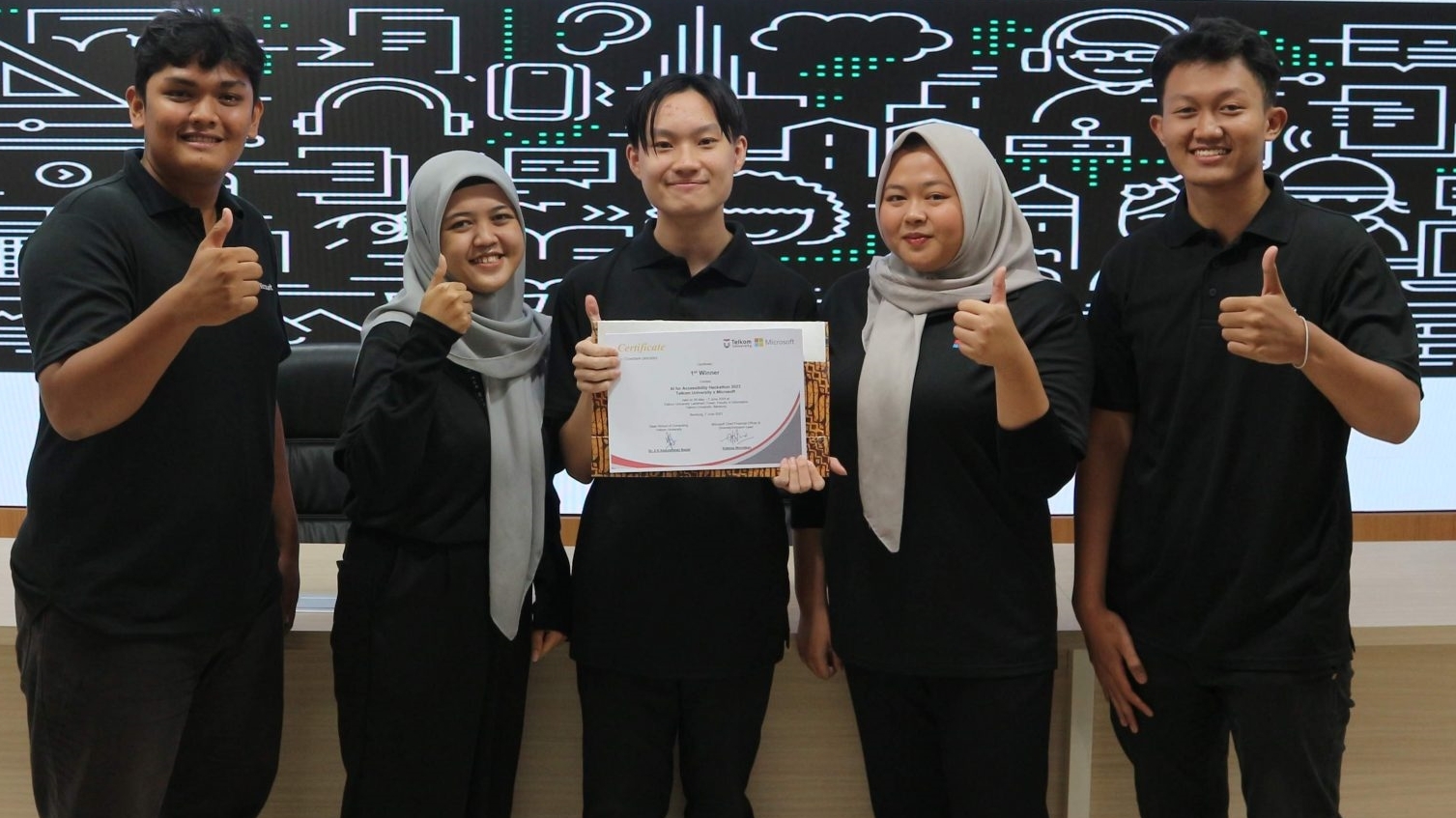
Singapore, 3 July 2023 – The Microsoft AI for Accessibility (AI4A) Hackathon 2023 is an annual event for teams in Asia Pacific to tackle problem statements and build solutions for a more inclusive and accessible society. In 2023, 119 teams of undergraduates from universities in Indonesia, Malaysia, Philippines, Singapore, Sri Lanka, Thailand, and Vietnam created applications that addressed real-life challenges for people with disabilities.
Indonesian team Prambanan from Telkom University developed Katakan AI (which translates to ‘Say AI’ in Bahasa Indonesia), a one-of-its-kind solution to empower people who are deaf or with a hearing disability to communicate more effectively virtually. Combining the features of Azure Cognitive Services, Microsoft Translator, and an AI chat box, the team designed a stand-alone desktop and mobile platform application, as well as a browser plug-in for other virtual meeting tools. With hybrid working here to stay, the all-in-one solution aims to help them to enjoy a more efficient work environment.
In the Philippines, Team Cognitics from Lyceum of the Philippines University, Batangas invented a smart band [placed on the wrist] to proactively administer medication via psychometrics technology. Fusing AI with psychometrics technology, this emergency response product provides a rapid means to detect emergencies and administer necessary medication.
Team A-EYE from Universiti Teknologi, Malaysia developed an application prototype to help people who are blind or have low vision traverse roads and navigate traffic safely. Using Azure Custom Vision, this working prototype alerts them to prevent colliding with an object.
Team WRAP from National University of Singapore, School of Computing developed NAVI, a navigation app designed to empower individuals who are blind or have low vision to travel confidently. NAVI offers audible route directions and utilizes AI to detect obstructions and street markings in real-time through the smartphone camera. Moreover, the app accepts speech input for convenient control and provides a user-friendly interface with a large display and audible feedback, ensuring ease of use.
Team Hear Me representing Sri Lanka Institute of Information Technology introduced Hear Me, an AR-based self-learning application for children who are deaf or with a hearing disability. This interactive platform provides a rich learning environment that enhances communication skills and cognitive development, proving an invaluable resource for children communicating through sign language.
In Thailand, Team DEVA from King Mongkut’s University of Technology, Thonburi presented Neon, an AI-enabled presentation generator to assist people who are blind or have low vision, highlighting the profound influence of technology on enhancing their independence and quality of life.
Team ATP from Royal Melbourne Institute of Technology in Vietnam introduced AI SpeechCompanion, an application that supports people who stutter. The solution creates a personalized experience tailored to each person’s capabilities by allowing them to take notes, practice speaking, and receive encouragement. This will allow individuals who stutter to become more confident, empowering them in their daily lives.
“With more than 1.3 billion PWDs in the world and 690 million here in Asia Pacific, ensuring accessibility to technology has never been more urgent. Inclusive AI empowers individuals with disabilities, enabling them to fully participate in various aspects of life, including education, employment, and social interactions. It fosters equal opportunities, reduces biases, and breaks down systemic inequalities. I’m so proud to see the next generation of entrepreneurs and developers embrace inclusivity through programs like the Microsoft AI for Accessibility Hackathon. Together, we’re ensuring everyone can thrive, contribute, and benefit from the transformative potential of AI,” said Pratima Amonkar, chair for D&I and accessibility for Microsoft Asia Pacific.
Problem statements and winning hackathon
Six non-profit organizations from the seven countries contributed problem statements for the university students to hack. The teams built innovative solutions and AI-enabled applications on Microsoft Azure and presented them to a panel of judges from both technical and non-technical fields. The winning teams in each country were able to demonstrate a deep understanding of accessibility, design innovative solutions that were original, and showcase a willingness to take risks in the pursuit of creating value for people with disabilities. The teams had to show real-world impact, business models, and go-to-market plans to launch their solutions.
Categorized into Daily Life, Employability, Communication and Education, they provided students with authentic scenarios and situations faced by people with disabilities. Daily Life challenges included obstacles that can’t be detected by white canes, using automated cash machines, digital applications, cooking appliances and personal grooming. Under Employability, the statements included job matching, training, assessment, interview support and workplace navigation. In Communication, students explored how to explain facial expressions in a video conference, automating speech therapy, and in Education, making learning accessible to rural communities.
About Microsoft
Microsoft (Nasdaq “MSFT” @microsoft) enables digital transformation for the era of an intelligent cloud and an intelligent edge. Its mission is to empower every person and every organization on the planet to achieve more.




